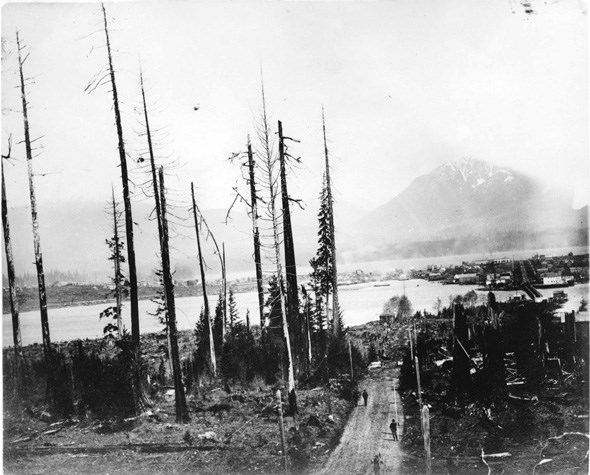As part of its ongoing mission to end the tyranny of geography, the City of Vancouver Archives is shoveling much of its dead-tree format holdings into open-format digital files. As the city announced today, the seven-volume compendium called "Early Vancouver" has gone online. It's actually quite exciting, because Early Vancouver is nothing less than the masterwork of Major James Matthews, the city's first archivist.
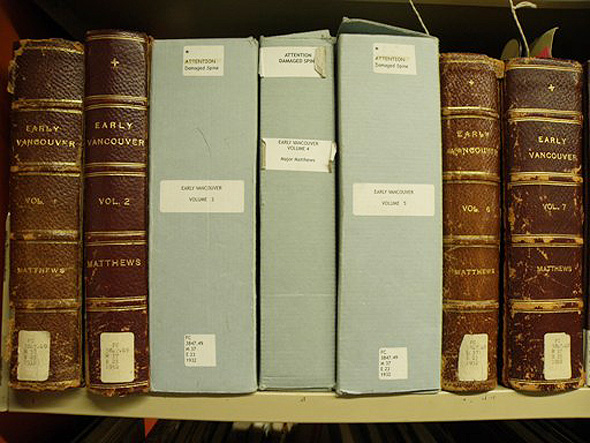 The seven brittle copies of 'Early Vancouver.' Photo courtesy of the Vancouver Archives.
The seven brittle copies of 'Early Vancouver.' Photo courtesy of the Vancouver Archives.
The seven volumes were a compilation of partly-typed, partly-annotated texts, with cross-references to other volumes, notes scribbled in the margins (a.k.a. 'marginalia'), and photograph references gathered between 1931 and 1956. The seven volumes as digital editions — all transcribed by hand, and now indexed and searchable — are keyword-indexed vignettes of the beginnings of this place as a "city." The Vancouver Archives says "Early Vancouver is consistently one of the most utilized sources of information in the Archives’ holdings on the very early beginnings of Vancouver and the stories of its residents."
On May 29, the Archives hosted a small reception for a full house of history buffs to celebrate the monumental achievement of getting the collection online and available to the wider public (that's you). Local author Lee Henderson was invited to read some of his favourite excerpts, which he came across while researching old Vancouver stories for his book The Man Game.
In this short video clip, Henderson reads from a section describing Joe Fortes, the city's first (volunteer) lifeguard, and how Fortes kept things civil in the gender-separated bathing zones in the early 1900s:
Henderson followed up the excerpt by saying that a passage about 'the Great English Bay Scandal' in Volume 7 described even more challenges in policing the beach:
The “Great English Bay Scandal” was a shocking thing. It shocked all Vancouver. Of course it was reported in the press, editorials were written, and I think it ultimately reached the City Council.It happened in this way. When old Joe Fortes was first self-appointed beach guard here at English Bay, there was a huge boulder at the foot of Denman Street—big as a house—and all women bathed to the west of it and all men to the east. Woe betide any smart-alex man who intruded westwards. The women called, Joe came running and chased the intruder away.
But, as time went on, women became bolder and invaded the men’s part, but still retained their old style bathing suits, which were more like dresses with flounces around the middle hanging like mudguards on a motor car. It was a wonder they were not drowned. They also wore stockings and sandals; they looked very nice, too.
Then one day one impertinent hussy, bolder than the others, went in bathing without her stockings. She was as sight to behold—she was bare naked right up to her knees. The Women’s Christian Temperance Union wrote to the press about it and what they wrote about the bold woman was published in the newspapers. She sued the W.C.T.U. for libel.
The case went to court and she got damages. And, if you don’t believe it, go down to the Police Court and see the records.
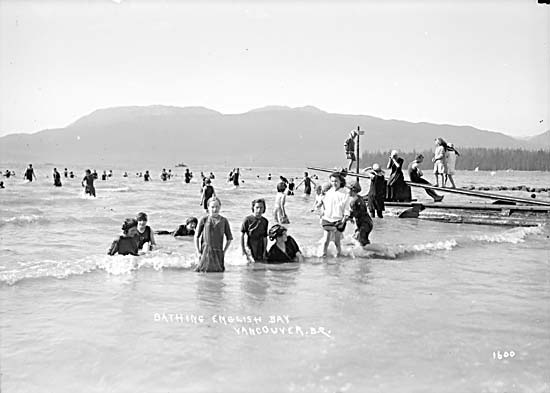 Bathers at English Bay, circa 1912 (and perhaps just one hussy?). Vancouver Archives (SGN 1015)
Bathers at English Bay, circa 1912 (and perhaps just one hussy?). Vancouver Archives (SGN 1015)
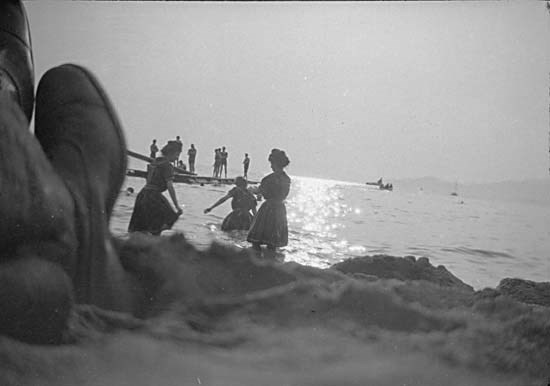
Bathers Hussies at English Bay, showing their knees at sunset in 1910. Vancouver Archives (CVA 677-749)
Matthews also documents the physical development of the city through descriptions of early photos, such as this one from 1887 showing the view from the triangle-wedge-block in Mount Pleasant:
Across False Creek, now Mt. Pleasant, 1887. Probably April 1887. From top of tree, stump or pole at what is now the South East corner of Seventh Ave. and Main St. This is the “New Road,” formerly “False Creek Road,” latterly Westminster Ave. and Main St., but west of the present location to avoid steeper grade. Seventh Ave. crosses between two nearest poles, part of Seventh Ave. appears in lower right hand corner. House on right believed to be Blair’s, first in Mt. Pleasant. Cordwood stacked in tall trees, and beside big burned stump. Surveyors at work, perhaps fixing location Westminster Ave., or making contour map made about that date...
And where there are no photos, there are sketches done by Major Matthews of what once was. For example, the first saloon:
In Early Vancouver, you'll also find lots of descriptions of old trails, big trees, wildlife encounters (a terrier encounters a bear, a tame deer helps itself to the pudding), and even stories from the pre-settler times. Matthews collected them all, as much as he could.
Sue Bigelow, the head of digital projects at the archives, said that Major Matthews, born in Wales in 1878, was an eclectic fellow with a penchant (or addiction?) for documenting his city and the equally eclectic people who lived there in the late 1800s and early 1900s. Matthews filled his home with photographs, documents, and all sorts of other mementos.
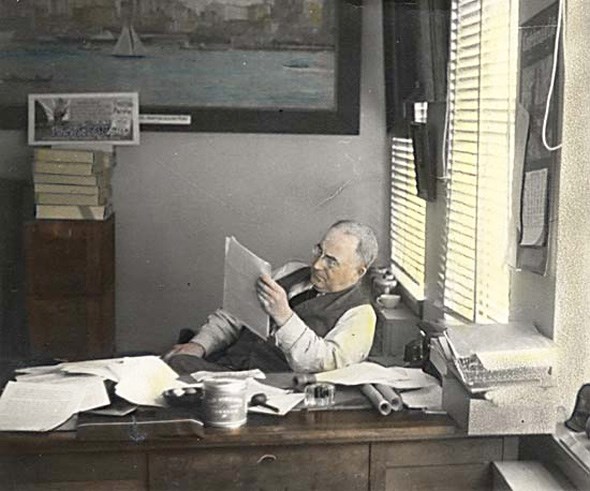 'The archivist at work'. Photo of J. S. Matthews courtesy of the City of Vancouver Archives.
'The archivist at work'. Photo of J. S. Matthews courtesy of the City of Vancouver Archives.
Matthews originally intended for his son to take over the collection, but when his son unexpectedly died, Matthews had to find another plan. He set out to secure a space that would outlive him at City Hall, and the quest to build a proper archive turned into a post-retirement volunteer career. Though his goal wasn't realised before he died, the Vancouver Archives was eventually created. Today it is a thriving leader in conservation and in digital conversion and preservation.
Major props for digitizing Early Vancouver go to the Vancouver Historical Society and the Government of Canada's Canadian Heritage department, which provided some of the funding for the digitization. Major props also go to the Vancouver Archives, for caring for the materials and doing the actual digitization work, and to the Major himself. Without his citizen-journalism hobby, we'd have nothing much to search through today.

